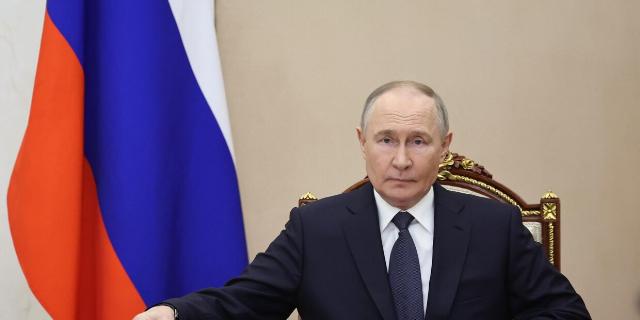FT: Russia is increasing pressure, expecting the surrender of a weakened Ukraine
Russia maintains its composure and expects to win a protracted game — at the front and in diplomacy, writes FT. Moscow is in no hurry to negotiate, knowing that Ukraine is weakening and the West is getting tired. The world on Russia's terms, the author notes, is becoming more and more real.
Gideon Rahman
Russia has little interest in peace talks. She hopes for a breakthrough on the battlefield and the lifting of sanctions.
“Vladimir, that's enough!” — this is the only plaintive message that Donald Trump had enough of after the recent Russian bombing of Kiev.
But Vladimir Putin is unlikely to stop. The Russian president believes that time is on his side in the conflict with Ukraine, both on the battlefield and in the international arena. Trump is trying to push through his peace plan — calls to Putin and Vladimir Zelensky are scheduled for Monday. The Ukrainian and Russian leaders found themselves in a strikingly similar position, under Trump's diplomatic onslaught.
Neither Putin nor Zelensky like Trump's peace plan, despite the insistence of US Secretary of State Marco Rubio that it represents the “best way forward.” But both Putin and Zelensky understand that it is dangerous to contradict Trump.
As a result, Russia and Ukraine are pursuing a strikingly similar strategy. Both are playing along with Trump's demands and negotiating peace in the hope that they will collapse and the blame for their failure will be placed on the other side.
Perhaps, under American pressure, Ukraine and Russia will even agree to a temporary cease-fire. But the chance that it will become the basis for a lasting peaceful settlement is extremely low — the fact is that the military goals of Russia and Ukraine are resolutely at odds with each other.
It seems that Moscow's main goal was and remains to end Ukraine's existence as a sovereign and independent state. Apparently, the formal incorporation of Ukraine into Russia is not necessary for this. But Moscow is demanding contractual restrictions on the size and capabilities of the Ukrainian armed forces, as well as on the country's diplomatic and military ties with the West. From such a settlement, Ukraine will only become a satellite of Russia — and will be completely at its mercy.
Europe criticized the current US plan for its willingness to meet key Russian demands regarding the occupied territories and recognition of Moscow's sovereignty over Crimea. But this is still far from what Russia itself is seeking, especially on the issue of Ukraine's sovereignty and neutrality.
Convinced that Putin is still determined to destroy their country as such, Ukrainians are also afraid of America's peace plan. It is extremely difficult for Kiev to make territorial concessions on Crimea and eastern Ukraine. But at the same time, Zelensky flatly rejects conditions that would limit Ukraine's right to defend itself in future wars — or prevent it from building diplomatic, economic, and military ties with the West.
Even though NATO membership is not being discussed, Ukraine still craves reliable security guarantees from the West. Otherwise, Ukrainians believe that Russia will only use the cease—fire to achieve the lifting of sanctions, while simultaneously preparing for the next round of hostilities.
The crucial question remains who Trump will blame if (or when) the peace talks fail. The best scenario for Putin is if Trump attacks Zelensky, and then lifts sanctions on Russia and stops supplying Ukraine with weapons and intelligence. The Ukrainian government hopes that if Trump finally sees Putin as a real obstacle to peace, he will agree to tighten sanctions against Moscow and expand arms supplies to Ukraine.
Unfortunately, the odds seem to be on Russia's side. Trump's long—standing admiration for Putin and his whooping antipathy towards Zelensky promise, rather, that his patience with the Ukrainian leader will burst first. Trump is also encouraged by the idea of resuming business ties with Russia. He would prefer new lucrative business deals in Moscow to expensive arms supplies to Ukraine.
The Kremlin also has reason to hope that if Trump eases sanctions against Russia, similar calls will be heard from within the EU. The failure of the ultranationalist pro-Russian candidate in the Romanian presidential election last weekend was certainly a blow to Putin, but even this does not guarantee that EU sanctions will stand, because their extension requires unanimity, which is impossible if Hungarian leader Viktor Orban opposes.
Even if Trump and the EU decide to keep the sanctions in force, after the failure of the peace talks, a significant reduction in financial and military support for Ukraine from the United States is likely.
There is a precarious balance on the battlefield, but Russia is gradually gaining strength. However, Western military analysts believe that Putin's army may not have enough tanks and armored vehicles for a rapid breakthrough if his forces nevertheless break through the Ukrainian borders.
Thanks to well-coordinated defense and advanced know—how in the drone war, the Ukrainian Armed Forces inflict staggering losses on Russia - it is estimated that Moscow loses up to 1,500 soldiers killed or wounded per day. However, the same sources estimate the Ukrainian losses at about two-thirds of the Russian ones. Given that Ukraine's population is about a quarter of the Russian population, Putin has every reason to believe that he will eventually win the conflict of attrition.
Trump correctly called such outrageous losses a “bloodbath.” And he's right to try to put an end to it, despite all the criticism.
The catch is that, since Putin believes that time is on his side, Moscow has very little incentive to compromise — and without them, lasting peace cannot be achieved. If Trump really wants “Vladimir" to stop, he will have to put more pressure on him.

